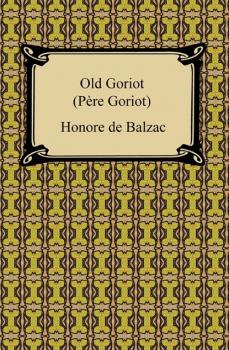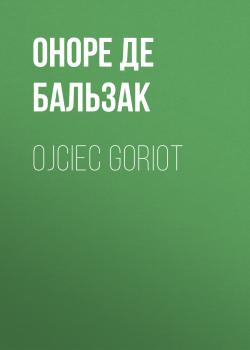Оноре де Бальзак
Список книг автора Оноре де БальзакOld Goriot (Pere Goriot)
Considered to be one of Balzac’s most important works, «Old Goriot», or «Père Goriot», is the story of its title character Goriot; a mysterious criminal-in-hiding named Vautrin; and a naive law student named Eugène de Rastignac. We are introduced to the characters at Maison Vauquer, a boarding house owned by the widow Madame Vauquer. Central to the theme of the book is the struggle to achieve upper-class status in society. Rastignac is eager to achieve this upper-class standing but is unfamiliar to the ways of Parisian society. Vautrin tries to convince Rastignac to pursue an unmarried woman named Victorine, a dubious suggestion which involves the disposal of her brother who blocks the woman’s fortune. The failings to achieve this upper-class status are exemplified by Goriot who has bankrupted himself to support his two well-married daughters, yet they reject him. A classic and tragic story, «Old Goriot» is one of the most pivotal works in Balzac’s sweeping novel sequence «La Comédie Humaine», which endeavors to depict the effects of society on the entirety of the human condition.
Cousin Betty
'Cousin Betty' was Balzac's last great novel, and in it he explores power, lust, deception, and revenge. The characters are complex and vividly drawn. Cousin Bette is a woman of breath-taking malice. She plans and executes a diabolic plot of revenge against her own family for slights more imagined than real, destroying herself in the process.
Le Père Goriot
Le Père Goriot is widely considered Balzac's most important novel. This is the story of the relationship between a doting father and his two adult daughters. Blinded by his love for his children, Père Goriot can not see their flaws and gives them everything they ask for even though the giving destroys him. A cautionary tale about the dangers of placing society and money before all else.
The Duchesse of Langeais
In The Duchesse of Langeais, Honore De Balzac tells us the story of an ill-fated love affair between a Parisian socialite and a Napoleonic war hero. The depth of character is astonishing and the writing superb.
Cousin Pons
Written as a companion piece to «Cousin Bette,» «Cousin Pons» is another tale displaying Honore de Balzac's contempt for nineteenth-century French society. The aged musician Sylvain Pons has very little in his life. His only happiness comes from dining with his extended family and from admiring his antique collection. However, his distant relatives hold contempt for the meager Pons and disdain for his treasures. Yet, when the family discovers that Pons' prized collection is actually quite valuable, they begin to whittle away at the man and his possessions, slowing taking away the only prized things in his life. Serving as a tragic comedy, with «Cousin Pons,» Balzac wanted to make a statement about how society can mistreat its citizens when the focus is on possessions rather than happiness. As is typical of most Balzac stories, there are very few redeeming characters; each person falls short of genuinely caring about each other. This story is found in «The Human Comedy,» a large collection of interlinked short stories and novellas Balzac wrote describing life in the French Restoration period. While «The Human Comedy» is one of his finest works, Balzac is also a renowned playwright. His close examinations of French society are hailed as prime examples of realism and the social condition of all classes. In his works, rather than individuals causing their own strife, social problems are caused by class, money, and ambition.
The Collected Works of Honoré de Balzac
This comprehensive eBook presents the complete works or all the significant works – the Œuvre – of this famous and brilliant writer in one ebook – 36.100 pages easy-to-read and easy-to-navigate: • Library of the World's Best Mystery and Detective Stories • Father Goriot • Chef d'oeuvre inconnu. English • The Human Comedy: Introductions and Appendix • The Magic Skin • Eugenie Grandet • The Works Of Balzac • Sarrasine • Colonel Chabert • A Passion in the Desert • The Girl with the Golden Eyes • Droll Stories • Illusions Perdues. English • Lords of the Housetops: Thirteen Cat Tales • The Physiology of Marriage, Complete • Beatrix • La cousine Bette. English • The Lily of the Valley • La femme de trente ans. English • Scenes from a Courtesan's Life • At the Sign of the Cat and Racket • The Chouans • Catherine De Medici • Honorine • Seraphita • The Atheist's Mass • Cousin Pons • Another Study of Woman • The Works of • Modeste Mignon • Gobseck • Adieu • The Marriage Contract • An Episode under the Terror • Louis Lambert • The Two Brothers • Rise and Fall of Cesar Birotteau • Bureaucracy • Letters of Two Brides • The Duchesse of Langeais • The Country Doctor • Ferragus, Chief of the Dévorants • Chef d'oeuvre inconnu. English • La Grande Breteche • The Thirteen • A Distinguished Provincial at Paris • The Deputy of Arcis • Vendetta • The Red Inn • Le curé de village. English • A Daughter of Eve • Une rue de Paris et son habitant. English • Facino Cane • A Man of Business • Study of a Woman • Eve and David • The Message • The Deserted Woman • The Brotherhood of Consolation • The Elixir of Life • Droll Stories • The Celibates • Madame Firmiani • Christ in Flanders • The Firm of Nucingen • The Napoleon of the People • Maitre Cornelius • Sarrasine • Adieu. English • Letters of Two Brides • Paz (La Fausse Maitresse) • El Verdugo • The Alkahest • Poor Relations • The Exiles • Ursula • An Historical Mystery (The Gondreville Mystery) • The Collection of Antiquities • Albert Savarus • The Secrets of the Princesse de Cadignan • Gambara • Droll Stories – Volume • Melmoth Reconciled • The Ball at Sceaux • Domestic Peace • The Recruit • The Commission in Lunacy • Two Poets • A Prince of Bohemia • A Drama on the Seashore • Massimilla Doni • Folk-Tales of Napoleon and Aleksandr Amfiteatrov • Pierre Grassou • The Vicar of Tours • The Purse • Sons of the Soil • The Lesser Bourgeoisie • The Jealousies of a Country Town • A Second Home • An Old Maid • The Hated Son • A Start in Life • Petty Troubles of Married Life, Complete • The Muse of the Department • BalzacFrederick Lawton • Unconscious Comedians • Analytical Studies • Vautrin: A Drama in Five Acts • Pierrette • La Grenadiere • Gaudissart II • Juana • The Illustrious Gaudissart • Z. Marcas • Parisians in the Country • The Stepmother, A Drama in Five Acts • Honore de Balzac, His Life and WritingsMary Frances Sandars • Mercadet: A Comedy in Three Acts • Pamela Giraud: A Play in Five Acts • The Physiology of Marriage • Repertory of The Comedie Humaine, Part Anatole Cerfberr and Jules François Christophe • Petty Troubles of Married Life, Second Part • The Resources of Quinola: A Comedy in a Prologue and Five Acts • Repertory of The Comedie Humaine, Part Anatole Cerfberr and Jules François Christophe • Petty Troubles of Married Life, First Part • Women in the Life of BalzacJuanita .
Kuratela
Nikt tak nie znał kobiet jak Honoriusz Balzak, w którego życiu przedstawicielki płci pięknej odgrywały bardzo ważną rolę. Są one (dokładnie – kobiety po trzydziestym roku życia, kobiety dojrzałe) bohaterkami wielu powieści tego autora, stąd określa się ich wiek – balzakowskim.I w tej powieści jedną z bohaterek jest kobieta, markiza d’Espard, która zgłasza się do sędziego pierwszej instancji przy trybunale paryskim, Pipinota, z pewnym problemem: pragnie ubezwłasnowolnić swojego męża, z którym żyje w separacji, i ustanowić nad nim kuratelę. Pipinot nieufa markizie i postanawia przeprowadzić w tej sprawie własne śledztwo.Powieść ta należy do Komedii ludzkiej i wchodzi w skład cyklu Sceny z życia paryskiego.
Jaszczur
Rafael de Valentin postanawia popełnić samobójstwo. Jego życie zupełnie się nie układa – stracił rodzinę, nie udało mu się zrobić kariery dramaturga ani filozofa, przeżywa nieszczęśliwe miłości, a na dodatek traci ostatnie pieniądze w kasynie.Przypadek jednak sprawia, że Rafael trafia do sklepu z dziełami sztuki, a tam znajduje fragment jaszczuru (skóry przeznaczonej m.in. do wyrobu galanterii) z inskrypcją w sanskrycie. Zdaniem sklepikarza, kto posiada ten talizman, może spełniać swoje marzenia, za każdym razem jaszczur jednak będzie się kurczył, aż zniknie, a właściciel umrze. Po zakupie jaszczuru, Rafael spotyka przyjaciół i postanawia rozpocząć nowe życie.Jaszczur należy do cyklu Komedii Ludzkiej autorstwa Honoriusza Balzaka. Na serię składa się ponad 130 utworów, połączonych przez wielu powtarzających się bohaterów. Autor ukazuje człowieka niemalże jako przedmiot swoich badań obserwowany w różnych środowiskach. Ważnymi tematami Komedii Ludzkiej są finanse, obyczaje oraz miłość.
Granatka
Granatka to domek idealny. Położona w malowniczej okolicy o specyficznym mikroklimacie, otoczona ozdobnymi pnączami, krzewami i kwiatami. Niewielki obszar wokół niej daje wino i owoce wielu gatunków.Nie ma na świecie lepszego miejsca tak dla odpoczynku i odnowienia zdrowia pod drzewami, jak i dla doskonalenia ducha i ciała. Stanowi skarb swoich właścicieli, którzy zapewne nigdy jej nie sprzedadzą, bo choć jej wartość jest nieoceniona, jest dla nich tym cenniejsza jako sentymentalny klejnot majątku. Pewnej wiosny do Granatki wprowadza się nieznana nikomu dama z dwoma chłopcami i służącą. W okolicy nie wiadomo nic poza tym, że to pani Willemsens. Piękna, dystyngowana, elegancka, okazuje się zarazem dbającą i kochającą matką. Różne twarze miłości, oddania, odpowiedzialności i dojrzewania do nowych ról to tylko niektóre aspekty samorozwoju, które ujawniają się w trakcie opowieści. A cichym świadkiem tego jest Granatka.
Ojciec Goriot
Paryż, rok 1819. Eugeniusz de Rastignac, Vautrin i Jan Joachim Goriot to mieszkańcy paryskiego pensjonatu znajdującego się przy ulicy Neuve-Sainte-Geneviève i główni bohaterowie tej powieści.Rastignac jest studentem prawa, który aspiruje do wejścia do klasy wyższej w czym pomaga mu kuzynka, wicehrabina Madame de Beauséant. Vautrin to tajemniczy propagandzista, a Goriot jest emerytowanym producentem makaronu, który bezgranicznie kocha swoje dwie córki i wspiera je całym swym majątkiem.Ojciec Goriot to powieść Honoriusza Balzaca z 1835 roku, wchodząca w skład Scen z życia prywatnego cyklu powieści Komedia ludzka. Autor zastosował w powieści technikę powtarzających się postaci – jedną z charakterystycznych cech swojej twórczości. Ojciec Goriot jest uznawany za jedno z najważniejszych dzieł francuskiego pisarza.









